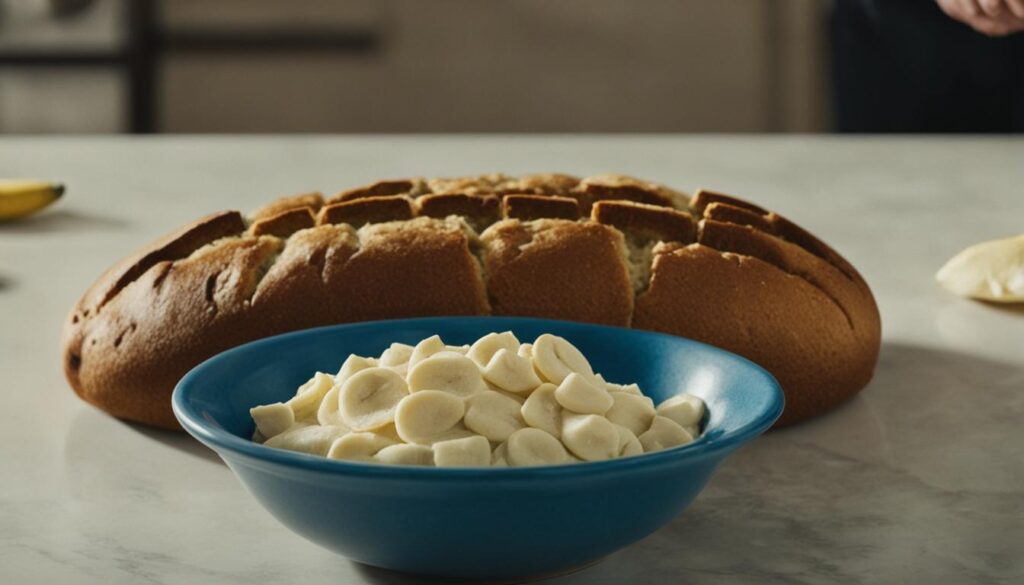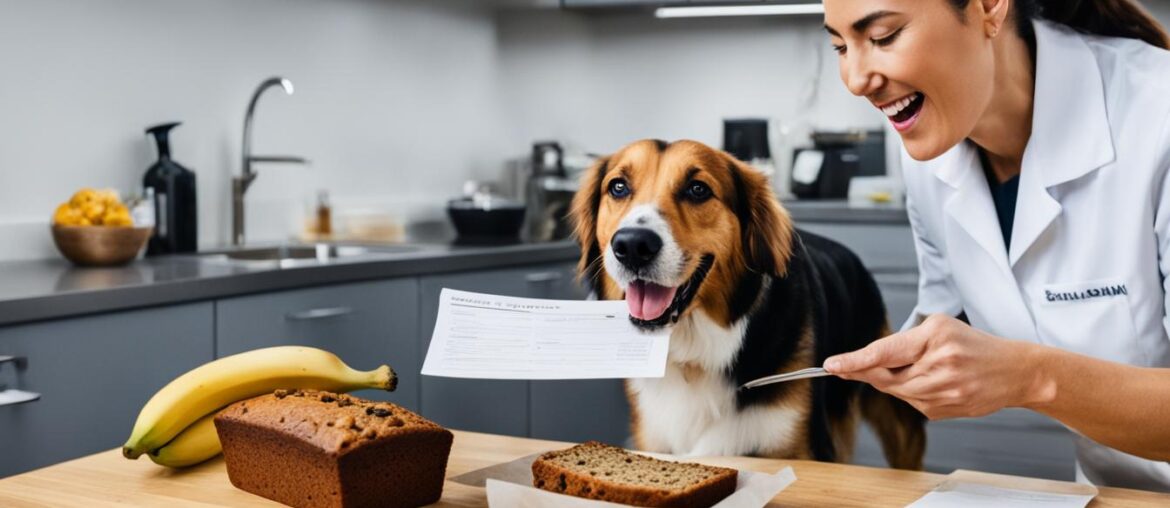As a dog owner, it’s natural to want to share delicious treats like banana bread with your furry friend. However, it’s important to consider whether banana bread is safe for dogs to eat. While bananas themselves are generally safe and can even provide health benefits for dogs, banana bread often contains ingredients that can be harmful to our canine companions.
Before giving your dog any new foods, including bread, it is essential to consult with your veterinarian. They will be able to provide guidance based on your dog’s specific dietary needs and any underlying health conditions. This will help ensure that you make informed decisions and keep your dog’s well-being a top priority.
When it comes to banana bread, there are several ingredients commonly found in recipes that can be potentially dangerous for dogs. These include:
- Sugar: Excessive consumption of sugar can lead to obesity, dental problems, and other health issues in dogs.
- Raisins: Raisins are highly toxic to dogs and can cause kidney failure.
- Macadamia Nuts: Macadamia nuts are poisonous and can cause weakness, tremors, and hyperthermia in dogs.
- Nutmeg: Nutmeg contains a compound called myristicin, which can be toxic to dogs, causing symptoms such as tremors, seizures, and hallucinations.
Given these potential risks, it is generally best to avoid feeding your dog banana bread or any baked goods that contain these ingredients. Instead, opt for safer alternatives that are more suitable for your dog’s diet.
Key Takeaways:
- Banana bread may contain ingredients that can be harmful to dogs, such as sugar, raisins, macadamia nuts, and nutmeg.
- It is essential to consult with your veterinarian before introducing any new foods, including bread, to your dog’s diet.
- When giving your dog treats, prioritize their well-being and choose healthier options that align with their specific dietary needs.
Can Dogs Eat Bread? The Risks and Benefits

While bread is generally safe for dogs to consume, it is important to consider the potential risks and benefits. Bread offers little nutritional value and can contribute to weight gain, obesity, and even diabetes if consumed in large quantities. Some dogs may also have sensitivities or allergies to certain types of bread, resulting in upset stomachs or digestive issues.
Bread dough made with yeast poses additional risks to dogs. The dough can expand in their stomachs, leading to bloating and potential gastrointestinal blockages. Moreover, as the yeast ferments, it produces alcohol, which can cause alcohol toxicity in dogs. This can have serious health consequences and may require immediate veterinary attention.
It’s best to limit the amount of bread you give to your dog and opt for healthier treat options. While an occasional small piece of bread is unlikely to cause harm, it should not be a regular part of their diet. Instead, focus on providing your furry friend with a balanced and nutritious diet that meets their specific nutritional needs.
The Risks of Bread Dough
Bread dough poses significant risks to dogs due to the presence of yeast and its ability to ferment in their stomachs. The resulting expansion can lead to bloating, gastric dilatation, volvulus (GDV), and alcohol toxicity. These conditions can be life-threatening and require immediate veterinary intervention. It is crucial to keep bread dough out of your dog’s reach to prevent ingestion and potential health complications.
| Risks of Bread Dough for Dogs | Consequences |
|---|---|
| Bloating | Can lead to discomfort, pain, and potential gastrointestinal blockages. |
| Gastric Dilatation-Volvulus (GDV) | A life-threatening condition where the stomach twists and traps gas and food. |
| Alcohol Toxicity | As the yeast ferments, it produces alcohol, which can be toxic to dogs. |
Note: The table above outlines the risks associated with dogs consuming bread dough.
It’s important to be vigilant and ensure that bread dough is kept securely stored when baking or preparing dough-based recipes. Avoid leaving dough unattended, especially if you have a curious canine companion who might be tempted to snatch it.
Types of Bread Dogs Can Eat

When it comes to feeding your furry friend bread, it’s crucial to choose the right type. Here are some safe bread options for dogs:
1. Plain Wheat Bread
Plain wheat bread is generally safe for dogs to eat in small amounts. It provides carbohydrates and can be a source of energy. However, remember that bread should only be given to dogs as an occasional treat, rather than a staple in their diet.
2. Sourdough Bread
Sourdough bread can be a safe option for dogs as long as it does not contain any toxic ingredients like garlic or onion. The fermentation process in sourdough bread can make it easier to digest for some dogs.
3. White Bread
White bread, which is made from refined grains, is generally safe for dogs to consume in moderation. However, it lacks nutritional value and should not be a regular part of their diet.
4. Rye Bread
Rye bread is safe for dogs to eat in small amounts. It contains some beneficial nutrients, such as fiber and B vitamins. Just make sure the rye bread is free from ingredients like garlic or onion, which can be toxic to dogs.
5. Pita Bread
Pita bread can be a safe option for dogs as long as it is plain and does not contain any harmful ingredients. It can be a healthier alternative to other types of bread, especially if served in moderation.
6. Gingerbread
Gingerbread should be avoided when it comes to feeding your dog. It often contains sugar and nutmeg, which can be harmful to dogs. It’s best to keep gingerbread away from your furry friend to prevent any potential health issues.
Remember, while these types of bread are generally safe for dogs, it’s important to offer them in moderation and avoid ingredients that might be toxic to them.
Now that we’ve covered the types of bread dogs can eat, let’s explore the health benefits of another dog-friendly food: bananas.
The Health Benefits of Bananas for Dogs

Bananas are safe for dogs to eat and can provide some health benefits. They are a good source of fiber, which can help with gastrointestinal issues and promote regular bowel movements. Bananas also contain vitamins and minerals like vitamin C, vitamin B6, potassium, magnesium, and biotin, which can support various aspects of your dog’s health.
With their sweet and creamy texture, bananas are a tasty treat that many dogs enjoy. However, it’s important to remember that moderation is key when feeding your dog bananas. Too much banana intake can lead to digestive upset or an increased intake of sugar, which may not be suitable for dogs with specific health conditions like diabetes.
The fiber content in bananas can have several benefits for your dog’s digestion. It helps to regulate bowel movements, preventing both diarrhea and constipation. The natural fibers in bananas can also aid in improving overall gut health and promoting a healthy gut microbiome.
In addition to fiber, bananas are a rich source of vitamins and minerals that play an important role in your dog’s overall health. Vitamin C helps support the immune system, while vitamin B6 is important for brain development and function. Potassium is essential for proper muscle and nerve function, and magnesium contributes to bone health. Biotin is crucial for maintaining healthy skin and coat.
| Nutrient | Amount Per 100g of Banana |
|---|---|
| Fiber | 2.6g |
| Vitamin C | 9.1mg |
| Vitamin B6 | 0.4mg |
| Potassium | 358mg |
| Magnesium | 27mg |
| Biotin | 0.012mg |
When feeding bananas to your dog, it is important to introduce them gradually and in small quantities to prevent any digestive upset. Start with a small slice or chunk and observe how your dog reacts. If there are no adverse effects, you can continue to offer bananas as an occasional treat.
It’s worth noting that bananas should always be given as a standalone snack or treat. Avoid feeding your dog banana bread or any baked goods that contain bananas, as they may also contain harmful ingredients like sugar, nuts, or spices that can be toxic to dogs.
Can Dogs Eat Banana Bread? The Dangers of Certain Ingredients

While bananas themselves are safe for dogs, banana bread often contains ingredients that can be toxic to them. Common ingredients found in banana bread, such as sugar, raisins, macadamia nuts, and nutmeg, can be harmful or even toxic to dogs. It’s important to avoid feeding your dog banana bread or any baked goods that contain these ingredients.
Banana bread is a delicious treat for humans, but it can pose serious health risks to our canine companions. Dogs have different digestive systems and metabolisms than humans, which means certain ingredients that are safe for us can be toxic to them. Let’s take a closer look at why banana bread is not suitable for dogs.
Sugar: Banana bread typically contains added sugar, which can lead to weight gain, diabetes, and dental problems in dogs. A sugary diet can also weaken the immune system and increase the risk of various health issues.
Raisins: Raisins and grapes are toxic to dogs and can cause kidney failure. Even a small amount of raisins in banana bread can be harmful to your furry friend. It’s best to keep all baked goods containing raisins out of their reach.
Macadamia Nuts: Macadamia nuts are highly toxic to dogs and can cause muscle weakness, tremors, and even paralysis. If your banana bread contains macadamia nuts, it is essential to keep it away from your canine companion.
Nutmeg: Nutmeg is another common ingredient in banana bread that can be toxic to dogs. It can cause neurological problems, such as seizures, tremors, and high blood pressure, when ingested in large amounts.
While bananas themselves are beneficial for dogs and can provide vitamins and dietary fiber, the additional ingredients in banana bread make it unsafe for canine consumption. It’s crucial to prioritize your dog’s health and avoid giving them any baked goods that contain these potentially harmful ingredients.
As responsible pet owners, it’s essential to be aware of the potential dangers and risks associated with certain foods before sharing them with our furry friends. When it comes to banana bread, it’s best to err on the side of caution and avoid feeding it to your dog.
The Risks of Bread Dough for Dogs

Bread dough made with yeast can pose significant hazards to dogs. When a dog consumes raw bread dough, the warm and moist conditions of their stomach provide an ideal environment for the yeast to ferment and rise. This fermentation process can lead to several dangerous conditions that require immediate medical attention.
Gastric Dilatation-Volvulus (GDV)
One of the most severe consequences of dogs ingesting bread dough is gastric dilatation-volvulus (GDV), commonly known as bloat. The expanding dough causes the stomach to distend, creating immense pressure on surrounding organs. If left untreated, GDV can result in life-threatening complications such as reduced blood flow to vital organs or the twisting of the stomach, cutting off blood supply entirely.
Alcohol Intoxication
When yeast ferments in a dog’s stomach, it produces alcohol as a byproduct. Ingesting raw bread dough can lead to alcohol intoxication in dogs, which can cause neurological issues, respiratory depression, collapse, and even coma in severe cases.
To effectively safeguard your dog’s well-being, it is essential to take proactive measures to prevent ingestion of bread dough. Keep bread dough securely out of your dog’s reach, and be vigilant while baking or working with dough in the kitchen.
“The expanding dough causes the stomach to distend, creating immense pressure on surrounding organs.”
Symptoms to Watch for:
- Abdominal distention and discomfort
- Excessive drooling
- Unproductive attempts to vomit
- Restlessness or agitation
- Rapid breathing or panting
- Weakness or collapse
If you notice any of these symptoms or suspect your dog has ingested bread dough, contact your veterinarian immediately. Prompt veterinary intervention is crucial in mitigating potential life-threatening complications.
| Condition | Symptoms | Treatment |
|---|---|---|
| Gastric Dilatation-Volvulus (GDV) | Abdominal distention, unproductive vomiting, restlessness, rapid breathing, weakness or collapse | Emergency surgery to correct the twisted stomach, fluid therapy, gas decompression, post-surgical care |
| Alcohol Intoxication | Disorientation, neurological issues, respiratory depression, collapse | Induce vomiting, supportive care, IV fluids, monitoring of vital signs |
How to Safely Feed Your Dog Bread

If you choose to give your dog bread as an occasional treat, it’s important to do so safely. Dogs can eat bread, but there are a few precautions you should take to ensure their well-being.
- Remove any toxic ingredients: Before giving bread to your dog, make sure it doesn’t contain any toxic ingredients such as garlic, onion, raisins, or nuts. These ingredients can be harmful to dogs and should be avoided.
- Cut the bread into small, bite-sized pieces: To prevent choking, it’s best to cut the bread into small, manageable pieces for your dog. This will make it easier for them to eat and digest.
- Limit the amount of bread: While bread is not toxic to dogs, it should be given in moderation. Too much bread can contribute to obesity and other health issues. It’s best to offer bread as an occasional treat rather than a regular part of their diet.
- Consult with your veterinarian: Before introducing any new foods to your dog’s diet, including bread, it’s important to consult with your veterinarian. They can provide personalized advice based on your dog’s specific needs and health conditions.
Expert Tip:
“Feeding bread to dogs should be done with caution. While it can be a tasty treat for them, it’s important to ensure the bread is safe and appropriate for their consumption.”
By following these guidelines, you can safely feed your dog bread as an occasional treat without compromising their health. Remember to always prioritize a balanced and nutritious diet for your furry friend.
| Bread Safety Tips for Dogs |
|---|
| Remove toxic ingredients from the bread |
| Cut the bread into small, bite-sized pieces |
| Limit the amount of bread |
| Consult with your veterinarian |
Moderation and Healthy Alternatives
While dogs can safely eat bread in moderation, it is not necessary or beneficial for their overall health. As a responsible dog owner, it’s important to prioritize a balanced and nutritious diet for your furry friend. While bread may seem like a convenient treat, there are healthier alternatives that you can offer your dog.
Instead of feeding them bread, consider incorporating fruits and vegetables into their diet. Many fruits and vegetables are safe and beneficial for dogs, providing essential vitamins, minerals, and fiber. Some examples of dog-friendly fruits and vegetables include:
- Apples
- Carrots
- Blueberries
- Pumpkin
These natural, whole foods provide a range of nutrients that can support your dog’s overall well-being and promote optimal health.
Furthermore, there are plenty of dog-friendly treats available in the market specifically formulated to meet the nutritional needs of our canine companions. These treats are often made with high-quality ingredients and provide a healthy and tasty alternative to bread. When choosing treats, look for options that are free from harmful additives, preservatives, and excessive sugars.
A Dog-Friendly Banana Bread Recipe
If you’re looking to indulge your dog with a delicious homemade treat, you can try making a dog-friendly banana bread. This recipe eliminates the harmful ingredients found in traditional banana bread, making it safe for dogs to enjoy. Here’s a simple recipe:
Ingredients:
- 2 ripe bananas
- 1/4 cup unsweetened applesauce
- 1/4 cup honey
- 1/4 cup water
- 1 teaspoon vanilla extract
- 1 1/2 cups whole wheat flour
- 1/2 teaspoon baking powder
- 1/2 teaspoon baking soda
- 1/4 teaspoon cinnamon
Instructions:
- Preheat the oven to 350°F (175°C) and grease a loaf pan.
- Mash the ripe bananas in a mixing bowl.
- Add the applesauce, honey, water, and vanilla extract to the mashed bananas. Mix well.
- In a separate bowl, combine the whole wheat flour, baking powder, baking soda, and cinnamon.
- Add the dry ingredients to the wet ingredients and mix until well combined.
- Pour the batter into the greased loaf pan.
- Bake for 35-40 minutes or until a toothpick inserted into the center comes out clean.
- Allow the banana bread to cool completely before serving it to your furry friend.
This dog-friendly banana bread recipe is a safe and tasty alternative to traditional banana bread. However, it’s important to remember that even though this recipe is free from harmful ingredients, it should still be given to your dog in moderation. Treats should never replace a balanced diet and should always be given as an occasional indulgence.
By offering your dog healthy alternatives and limiting the amount of bread in their diet, you can ensure that they enjoy a nutritious and well-rounded diet.
Wrapping Up
In conclusion, while plain bread can be safely consumed by dogs in moderation, it is crucial to understand the potential risks associated with certain types of bread and the ingredients they may contain. When it comes to banana bread, caution should be exercised due to the inclusion of ingredients such as sugar, raisins, nuts, and spices, which can be harmful to dogs.
Consulting with your veterinarian is essential before introducing any new foods, including bread, to your dog’s diet. A balanced and nutritious diet should always be prioritized to ensure your dog’s overall health and well-being. By being informed and mindful of what you feed your furry friend, you can help them lead a healthy and happy life.
Remember, prevention is key, and a proactive approach can go a long way in safeguarding your dog’s health. So, it’s best to err on the side of caution and avoid feeding your dog banana bread or any other baked goods containing harmful ingredients.
FAQ
Can dogs eat banana bread?
While bread is not toxic to dogs, some banana bread recipes contain ingredients that can be harmful to dogs. It is best to avoid feeding your dog banana bread.
Is banana bread safe for dogs?
Banana bread may contain ingredients such as sugar, raisins, macadamia nuts, or nutmeg, which can be toxic to dogs. It is not recommended to feed banana bread to dogs.
Can dogs eat bread?
In moderation, plain bread is generally safe for dogs to eat. It is important to avoid breads that contain toxic ingredients such as garlic or onion.
What types of bread can dogs eat?
Dogs can eat plain wheat bread, sourdough bread, white bread, rye bread, and plain pita bread. It is important to remove any toxic ingredients and feed bread in moderation.
Can dogs eat bananas?
Bananas are safe for dogs to eat and can provide some health benefits. They are a good source of fiber and contain important vitamins and minerals.
Is banana bread toxic to dogs?
Banana bread may contain ingredients such as sugar, raisins, nuts, and spices that can be harmful or toxic to dogs. It is best to avoid feeding your dog banana bread.
Can dogs eat bread dough?
Bread dough made with yeast can be very dangerous for dogs. When ingested, it can cause bloating, gastric dilatation, volvulus, and alcohol intoxication. It is crucial to keep bread dough out of your dog’s reach.
How can I safely feed my dog bread?
If you choose to give your dog bread as an occasional treat, make sure it does not contain toxic ingredients. Cut the bread into small pieces and feed in moderation to avoid health issues.
Should I give my dog bread as a regular part of their diet?
Bread offers little nutritional value for dogs and can contribute to obesity or diabetes if consumed regularly. It is best to prioritize a balanced and nutritious diet for your dog.
Can I provide my dog with a healthier alternative to bread?
Instead of bread, consider offering your dog healthy alternatives such as fruits, vegetables, or dog-friendly treats. There are even recipes available for homemade dog-friendly banana bread without harmful ingredients.






